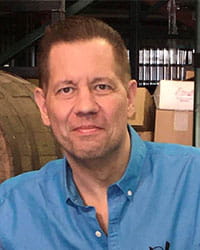Dale always considered himself a fortunate person. The now-52-year-old worked in the radio business, got married, and had been healthy all his life.
Yet, in 2016, he suffered a stroke, which took a significant toll on his kidney function.
Unfortunately, Dale’s kidney function did not recover with the rest of his body, and he was diagnosed with kidney disease.
“It was three years since my stroke and I felt fairly normal,” Dale said. “I felt like the luckiest guy in the world. I went about my daily life and was able to participate in all of my normal activities.”
Even though he felt healthy, Dale’s kidney function declined over time. In late 2019, he had no choice but to begin dialysis. Dialysis is a type of treatment that helps the body remove extra fluid and waste products from blood when the kidneys are not able to. Dialysis does not improve kidney function but instead replaces the functions that a kidney used to perform.
Dale was on dialysis for 18 months before his nephrologist explained to him that a kidney transplant was a possibility and would allow him to resume a much more normal lifestyle.
“My exact words to him were, ‘That seems like a huge mountain to climb,’” he recalls. “It was difficult to process that this was my reality.”
The Path to Living-Donor Kidney Transplant at UPMC
Dale was referred to UPMC Transplant Services for evaluation. In February 2021, Dale was added to the national kidney transplant waiting list.
Dale was familiar with living donation, as his mother worked in nursing at UPMC Jameson in New Castle, Pa. for 30 years.
“I always knew that living donation was a possibility, I just never met anyone who had gone through it,” Dale said. “And living in such close proximity to Pittsburgh, I also knew the positive reputation of UPMC Transplant Services, and that was really the only choice in my mind for a kidney transplant. I was very happy to be referred to UPMC.”
Dale and his wife immediately began their search for a living donor. Living-kidney donation is possible because people can survive with just one kidney.
Dale’s wife created a Facebook page to share his story and spread the word that Dale was looking for a living donor. He couldn’t believe the response they received.
“Within a week, we had thousands of views,” Dale said. “I was overwhelmed by the amount of people reaching out to help. I started getting messages from people I haven’t talked to in 30 years who were eager to get tested.”
Living donors can be family members, friends, or even complete strangers who have a desire to help someone in need. When a stranger donates to someone in need, they’re referred to as an altruistic donor.
By March, Dale had an approved living donor. He hadn’t previously met the person who stepped up to donate a kidney to him.
“In the midst of the COVID-19 pandemic, I was blown away that a stranger was offering to help me,” he recalls. “I feel grateful every day for it.”
Dale underwent a living-donor kidney transplant performed by Armando Ganoza, MD, transplant surgeon at Thomas E. Starzl Transplantation Institute, who also serves as the surgical director of the Pediatric Kidney Transplant Program at UPMC Children’s Hospital of Pittsburgh.
The Results: A Smooth Recovery After Transplant Surgery
Dale was discharged three days after his surgery. He says he was able to cook his wife dinner by the following week.
“After about six weeks, I felt like Dale again,” he says. “I feel so lucky to have had a quick and smooth recovery.”
Now, Dale is back to his daily activities and is friends with his living donor, who lives just 20 miles away.
“I'm not physically quite the guy that I used to be, but I am just grateful to be alive,” Dale says. “I don’t think I’d be here without UPMC.”
Dale says that he is thankful for the strong bonds he created with the staff at UPMC. He sent cards and letters to the nurses at UPMC Montefiore that assisted in his transplant journey, and even exchanges Christmas cards with the team who continues to assist with his monthly blood work at his local UPMC outpatient center.
“I cannot speak highly enough about the transplant professionals and everyone else on my care team at UPMC,” he says. “I received the best care possible. I always use the term ‘world class’ when describing my doctors and nurses. From my initial evaluation to the day I was discharged, I was treated with the utmost respect and care. And it will never be forgotten.”
Dale’s treatment and results may not be representative of all similar cases.



















